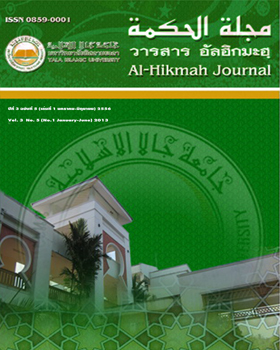Disapprobation-Scolding Interrogation in The First Five Chapters of The Holy Qur’an: Analytical, Rhetorical Study
Keywords:
Disapprobation-Scolding InterrogationAbstract
The research aims to: identify the question on the concept of and purpose, the detection of question (how) during the first five parts of the Quran, determine the forms and methods in these parts
The researcher has pursued in this research approach desktop inductive and descriptive and analytical, which reached a number of conclusions; including the following
1 - The question is an indication that the him order custom denier or legally, and a rebuke to something that occurred in the past or will happen in the future. 2 - Its purpose is to alert and remind the listener until he returns to himself and contemplate and meditate in his actions and behavior; of that deterred and aware of the answer himself, as well as to reform the state, and the denial after asking reported in reprimand, censure and more. 3 - received how to function to question the meaning of these parts 5 times; which the two types of the past and the present tense; come on image to provide feedback on name only, and the last came twice, and the present tense came three times. 4 - question dressed to the disbelievers and the hypocrites of the Jews and the faithful together, where they were directed to the disbelievers and the hypocrites of the Jews three times, twice to the faithful.
References
ابن تيمية، أحمد بن عبد الحليم. 1984. اقتضاء الصراط المستقيم. د.ط. تحقيق: ناصر عبد الكريم العقل. بيروت: دار الكتب العلمية.
ابن عاشور، محمد الطاهر بن عاشور. 1997. التحرير والتنوير. د.ط. تونس: دار سحنون للطبع والتوزيع.
ابن عطية، أبو محمد عبد الحق بن غالب. 1993. المحرر الوجيز في تفسير الكتاب العزيز. ط 1. تحقيق: عبد السلام عبد الشافي محمد، بيروت: دار الكتب العلمية.
أبو السعود، محمد بن محمد العمادي. د.ت. إرشاد القعل السليم إلى مزايا القرآن لكريم. د.ط. بيروت: دار إحياء التراث العربي.
الألوسي، شهاب الدين محمود ابن عبد الله الحسيني. 1994. روح المعاني في تفسير القرآن العظيم والسبع المثاني. ط 1. تحقيق: علي عبد الباري عطية. بيروت: دار الكتب العلمية.
الجرجاني، عبد القاهر بن عبد الرحمن. 1999. دلائل الإعجاز. ط 3. شرح وتعليق: محمد التنجي. بيروت: دار الكتاب العربي.
الحلبي، السمين الحلبي. 1994. الدر المصون في علم الكتاب والمكنون. ط 1. تحقيق: أحمد الخراط. دمشق: دار القلم.
الشعراوي، محمد متولي الشعراوي. 1991. خواطري حول القرآن الكريم. د.ط. د.م: الناشر أخبار اليوم.
الشوكاني، محمد بن علي بن محمد. 1997. فتح القدير الجامع بين فني الرواية والدراية من علم التفسير. ط 2. تحقيق: عبد الرحمن عميرة. المنصورة: دار الوفاء.
الصابوني، محمد علي. 1981. صفوة التفاسير. د.ط. بيروت: دار القرآن الكريم.
عرفة، عبد العزيز المعطي عرفة. 1984. من بلاغة النظم العربي: دراسة تحليلية لمسائل علم المعاني. ط 2. بيروت: عالم الكتب.
عونى، حامد عونى. د.ت. المنهاج الواضح للبلاغة. د.ط. المدينة المنورة: مكتبة العلوم والحكم.
القرطبي، أبو عبد الله محمد بن أحمد. 2001. الجامع لأحكام القرآن. د.ط. تحقيق: عبد



